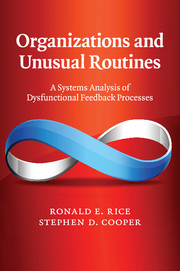Book contents
- Frontmatter
- Contents
- List of figures
- List of tables
- List of boxes
- Preface
- Acknowledgments
- 1 Crazy systems, Kafka circuits, and unusual routines
- 2 Causes, symptoms, and subroutines of unusual routines in six computer information/communication systems
- 3 Getting personal: unusual routines at the customer service interface
- 4 A multi-theoretical foundation for understanding unusual routines
- 5 A detailed case study of unusual routines
- 6 Summary and discussion of the case study results
- 7 Individual and organizational challenges to feedback
- 8 A multi-level and cross-disciplinary summary of concepts related to unusual routines
- 9 Recommendations for resolving and mitigating unusual routines and related phenomena
- 10 Summary and a tentative integrated model of unusual routines
- References
- Index
8 - A multi-level and cross-disciplinary summary of concepts related to unusual routines
Published online by Cambridge University Press: 10 January 2011
- Frontmatter
- Contents
- List of figures
- List of tables
- List of boxes
- Preface
- Acknowledgments
- 1 Crazy systems, Kafka circuits, and unusual routines
- 2 Causes, symptoms, and subroutines of unusual routines in six computer information/communication systems
- 3 Getting personal: unusual routines at the customer service interface
- 4 A multi-theoretical foundation for understanding unusual routines
- 5 A detailed case study of unusual routines
- 6 Summary and discussion of the case study results
- 7 Individual and organizational challenges to feedback
- 8 A multi-level and cross-disciplinary summary of concepts related to unusual routines
- 9 Recommendations for resolving and mitigating unusual routines and related phenomena
- 10 Summary and a tentative integrated model of unusual routines
- References
- Index
Summary
Because of the pervasiveness of the underlying phenomenon of dysfunctional feedback throughout individual, group, organizational, technical, and social relations, there are, of course, many related concepts. Unusual routines may be the general, underlying process of which many of these are specific forms, identified in specific conceptual and practical contexts. So this chapter reviews a wide range of related concepts. Scott Adams' comic strip Dilbert is probably the best archive of examples of these and related URs in organizational settings (www.dilbert.com).
Cognitive and social processing errors
Personal heuristics
Dorner (1989/1996) generally explains some reasons why we make faulty decisions that can lead to unintended consequences. First, human thinking is slow and cognitively bounded, leading us to economize on thinking. So, we tend to take action, or possibly plan and gather information and then take action, rather than “formulating our goals in concrete terms, balancing contradictory partial ones, and prioritizing them” (p. 186). Talking about thinking, actions, and problems does not mean better performance. We tend to focus on one or few variables instead of the complex interrelationships, reducing time and effort demands. We focus on one or a few rules to govern complex interrelationships, thus diminishing strategic thinking. We extrapolate linearly over some indefinite time, ignoring possible diversions, changes, and non-linear relationships. We ignore side effects and long-term interactions and repercussions. We conceptualize new situations in terms of prior, traditional approaches. And we seek to ignore consequences of actions. Human cognitive processes filter out and remove details from memory.
Information
- Type
- Chapter
- Information
- Organizations and Unusual RoutinesA Systems Analysis of Dysfunctional Feedback Processes, pp. 252 - 305Publisher: Cambridge University PressPrint publication year: 2010
